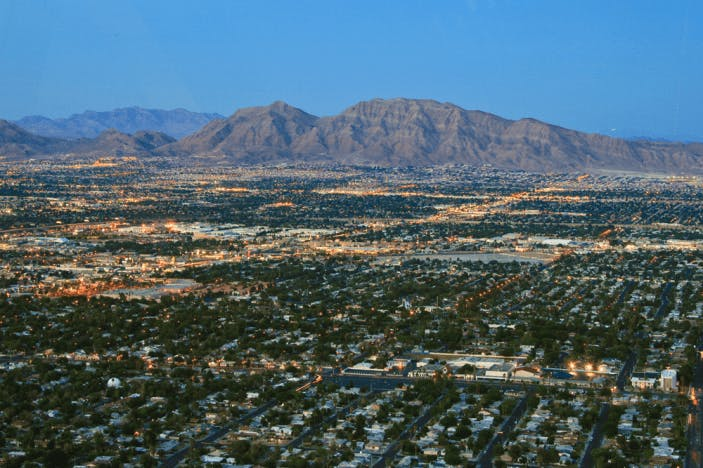
Others might think that half of Nevada is a lifeless desert and the other half is Las Vegas. Or that Nevadans are gamblers, drunkards, and people who love a good drive-thru wedding. But none of these stereotypes are true.
The “lifeless” desert in Nevada’s backyard isn’t exactly lifeless. There are fun activities waiting for you if you’re willing to brave the heat. And sure, Las Vegas is one of Nevada’s most famous sites, but a true Nevadan knows how to have a good time without visiting the strip. Finally, if you see a man drunk as a skunk on a street in Nevada, he’s more than likely a tourist.
All that said there is one reality that faces Nevadans daily: crime.
Crime in Nevada
I know crime, home security, and safety aren’t exactly sexy topics, but they are necessary.
Let’s start with crime. Depending on where you are in Nevada, the state can be dangerous. According to the data collected by NeighborhoodScout.com, the average violent crime rate in the Silver State is 7 per 1,000 residents, which is more than twice the national median (3 per 1,000 residents). On the other hand, Nevada’s property crime rate is somewhere in the middle. The annual property crime rate is 26.68 per 1,000 residents, just a little over the national median of 26 per 1,000 residents. This data shows that while there are several cities in Nevada with low crime rates, there is yet a darker side.
Home Security Provider Requirements in Nevada
How do you choose a security company you can trust? For starters, you should choose an alarm company that is recognized by your state.
There are specific regulations that apply to security companies as outlined by the Nevada Security Association. If an alarm company sells security systems but doesn’t install or repair equipment, all they need is a Sales Taxation Permit. However, if they also install security systems, they have to obtain a Nevada State Contractor’s License. Specifically, a C-2D Contractor’s License. This license is given to technicians that specialize in installation of low-voltage electrical appliances, such as alarm systems. An additional C-2C Contractor’s License is required for companies that also install fire detection equipment.
Aside from the licensing regulations imposed by the state, there are also several regulations at the county or city level.
For instance, in Clark County and in most parts of Southern Nevada, a Regulated Alarm License is required for alarm companies that offer professional monitoring. This applies whether the central station is in or out of the state, so long as they are monitoring for Clark County residents. Additionally, alarm companies that sell security equipment are required to acquire a Security Safety Sales License.
In Henderson City, a “Privilege Alarm” Business License is required for alarm companies that install alarm interface devices, i.e. control panels.
You should also consider that some of the cities in Nevada require a verified response before responding to alerts. The verification must come from a witness that is either on the scene, watching via a security camera, or a security guard dispatched by your alarm company. Las Vegas, North Las Vegas, and Henderson all require alarm verification.
Nevada Security Camera Requirements
To further enhance your home’s security, we recommend setting up security cameras. Security cameras can help improve your monitoring experience, allowing you to see your home even from across the world. However, you should be careful not to violate existing regulations governing the use of security cameras.
For starters, the Federal Video Voyeurism Law prohibits recording of videos at a place or time where privacy is rightfully expected. While this law is directed against peeping toms, it is wise to not place your cameras in areas where one expects privacy, such as in bedrooms or bathrooms.
Another federal law that may affect cameras is the Wiretap Law backed by the Nevada Revised Statute 200.650. The revised statute prohibits the intrusion of privacy using “listening devices” unless one of the parties involved gives consent. Modern security cameras can now be used as listening devices as most of them have audio and two-way talk features. Because of this, you should be place signage warning of the device or turn audio recording off.
Safety During Natural Disasters
Finally, let’s talk about safety during natural disasters.
Plan Ahead Nevada and USA.com advise Nevadans to prepare for earthquakes and storms.
According to USA.com’s data, Nevada ranks 5th on the list of states most prone to earthquakes. This is due to the number of faults in and around the state. According to another report, two faults near the California-Nevada border and one 100 miles from Las Vegas are primed to cause a moderate to major earthquake. Because earthquakes are unpredictable, everyone is urged to prepare. It is wise to keep an emergency kit that consists of food, water, batteries, flashlights, rechargeable radio, clothing, and other emergency supplies. Having an emergency escape plan is also recommended. The plan should include a meetup location, which route to take, and who takes care of whom (if you have kids or seniors). During an earthquake, the good ol’ “duck, cover, and hold” saves lives. Duck under a sturdy table, cover your head, and hold onto something strong. Once the shaking has stopped, quickly but carefully move out of the building, avoiding objects that might fall such as cabinets. And once you’re out of the building, quickly move to an open space far from trees or electric posts.
Storms also frequent the state. Unlike earthquakes, storms are much more predictable and, most of the time, you have plenty of opportunity to prepare before a storm hits. Regardless, always keep an emergency kit handy. If the power goes out, unplug all plugged appliances. Use flashlights instead of candles to avoid accidental home fires. If it’s cold, use layers of clothes to warm your body instead of gas heaters to avoid carbon monoxide poisoning. A common side effect of storms is flooding. Most floods only cause minor damage, but some are powerful enough to warrant an evacuation. If you’re asked to evacuate, do so immediately. While evacuating, try to avoid walking or driving in the path of flowing water.
Staying safe, whether from criminals or natural disasters, is a task that has to be carried out continuously. But with the right equipment, the task becomes much simpler.

